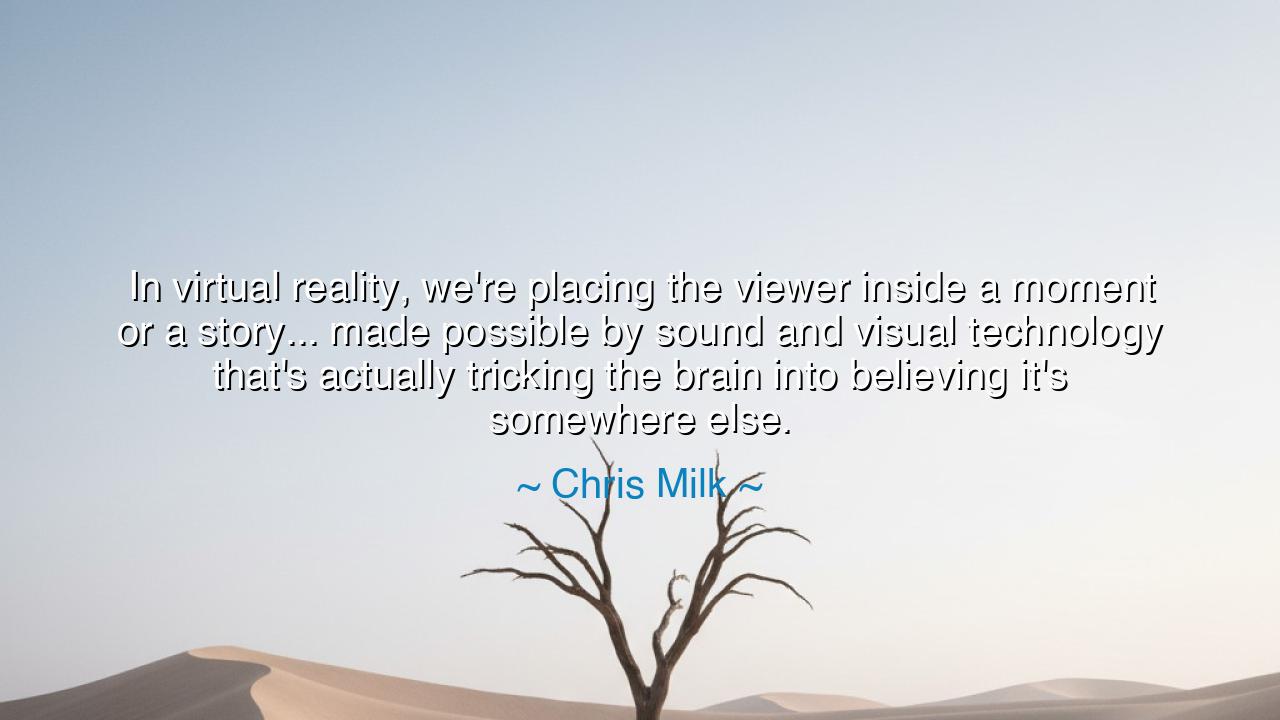
In virtual reality, we're placing the viewer inside a moment or
In virtual reality, we're placing the viewer inside a moment or a story... made possible by sound and visual technology that's actually tricking the brain into believing it's somewhere else.






Hear now the words of Chris Milk, who declared: “In virtual reality, we're placing the viewer inside a moment or a story… made possible by sound and visual technology that's actually tricking the brain into believing it's somewhere else.” This saying, though uttered in our modern age, carries the gravity of an eternal truth. For he speaks not merely of machines and images, but of the ancient capacity of the human spirit to be transported beyond the borders of flesh and stone. It is the same fire that once leapt from the mouths of poets, that once glowed in the visions of prophets, now reborn in the circuits of new invention.
When Milk speaks of placing the viewer inside a moment, he recalls the eternal desire of humankind: to step beyond the veil of our own skin and to dwell within another’s dream. Long ago, bards sang epic tales by the fire, and their voices painted worlds more vivid than the morning sun. The listener felt themselves standing with warriors at the gates of Troy, or kneeling in sorrow beside kings undone by fate. In this way, the ancients too practiced a form of virtual reality—not of glass lenses and screens, but of language, rhythm, and imagination.
The power of sound and vision, joined together, has always been the bridge that leads mortals into realms unseen. When the first cathedral windows caught the sunlight in colored glass, peasants and princes alike felt they had entered into heaven itself. Their brains were tricked, yes, but in that trick lay transformation. The humble brick and stone of earth became for them the gates of paradise. Technology, whether humble or mighty, is ever the servant of the same eternal truth: the heart yearns to believe it walks in a world beyond the present one.
Consider, too, the tale of the explorer Hernán Cortés, who came upon the temples of the Mexica. The Spaniards beheld walls clad in paintings and carvings so vivid that even hardened soldiers felt themselves cast into the very myths of that land. Such was the mastery of symbol and art that the mind could no longer distinguish between the real and the imagined. Though no headsets or electric screens existed, the same spell was woven. Thus we see that the wisdom of Milk’s words is not confined to our modern devices but stretches back into all ages.
Yet, though technology tricks the brain, we must not despise it as deceit. For is it not true that love, too, tricks the heart into seeing another as more radiant than the stars? Is it not true that hope tricks the weary into believing dawn shall break though the night is long? What is the human story itself if not the eternal art of believing we are somewhere else—braver, freer, wiser than we were? In this sense, the “trick” is not a falsehood, but a gateway to meaning.
Let us, then, take heed. The lesson of Milk’s vision is this: seek always the stories that uplift your soul, whether through the shimmering of a headset, the echo of a song, or the pages of a book. For what you allow into your mind shall shape the world you believe you live in. If you dwell only in dark illusions, your spirit will wither. But if you choose noble tales, heroic journeys, and hopeful visions, then even a humble room shall become a temple of light.
Therefore, beloved reader, take practical action: guard your mind as a sacred garden. Feed it only with stories that strengthen, sounds that heal, and visions that ennoble. When you use these new tools of virtual reality, do so not to escape life, but to deepen your understanding of it. Walk in the shoes of another, see through their eyes, feel their struggles, and return to your own body wiser and more compassionate. In this way, the ancient longing of humankind—to live beyond the narrowness of one’s own frame—will not be wasted, but will ripen into wisdom for the generations to come.
Thus, the saying of Chris Milk is not merely about machines, but about the destiny of mankind: to journey across the thresholds of perception, and in doing so, to learn anew what it means to be fully human. In tricking the brain, we awaken the soul.






AAdministratorAdministrator
Welcome, honored guests. Please leave a comment, we will respond soon